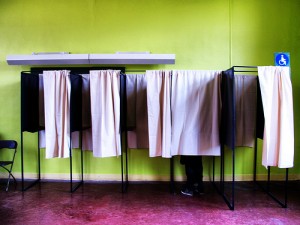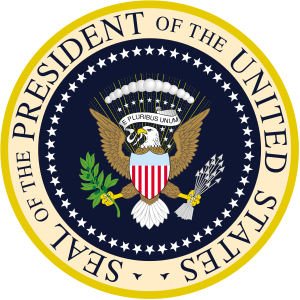Give to Caesar what is Caesar’s, and give to God what belongs to God. But what belongs to God? In this pre-Election-Day sermon on Luke 20:20-26, Pastor David urges us to be loyal to Jesus before all others.
Resting in Jesus during Election Season
The news coverage is nonstop. Twenty-four hours a day, we can find the latest information, gossip, analysis, and arguments about why Hillary Clinton or Donald Trump (or Gary Johnson or Jill Stein) should or should not be our next President. One presidential debate took place earlier this week; two more will follow in the next month. As a nation, we can hardly contain our excitement – not to mention our hopes, our disillusionment, our fears, and our anger – about this whole process.
Honestly, I have grown weary of this political season. As I scrolled through my Facebook timeline last night, I saw nothing but aggressive, one-sided posts (supporting either major candidate). I saw people arguing angrily with their friends about one issue or another. I saw memes and jokes that belittled one candidate or another. I saw long, thoughtful articles explaining why we should all vote for one candidate or another.
But I didn’t see much of Jesus in the discussion. Continue reading
The Kingdom is Divisive
Fire and water: signs of God’s judgment. Jesus sounds pretty serious in today’s text, Luke 12:49-56. It’s a question of loyalty, really. Where are your loyalties?
Super Tuesday, Lions, and Lambs
Today is “Super Tuesday,” a day in which some presidential candidates will vault ahead in their pursuit of their party’s nomination, and others will experience great disappointment. As a nation, we are waiting with bated breath to see what happens next.
Today is also the day of another snowstorm here in central Michigan. We are projected to see 6-10 inches of snowfall by this evening. Looking outside right now, I see a snow-covered road and beautifully dusted pine trees. It’s beginning to look a lot like winter. Time will tell how much today’s snowstorm will affect people’s lives, in terms of cancelled events, power outages, and auto accidents.
Today is March 1, as well – the first day of a new month. Who knows what this month will hold? The presidential race will surely change; hopefully our weather will, also. As one Facebook friend wrote today, “March truly comes in like a LION.” An old adage suggests that if March comes in like a lion, it will go out like a lamb. If the weather looks horrible on March 1 (like it does today), then in a few weeks it will look much better. One can hope, anyway.
But I see another layer of meaning in that saying. On this “Super Tuesday,” we are focusing our collective attention on a few individuals whose names appear on ballots in thirteen states. Many lions are competing for supremacy in the power struggle of our political system.
If March begins like a lion, how will it end? Continue reading
Following the Light
The Wise Men followed a star and visited Jesus in Bethlehem. What if this well-known story is not about sentimental nativity scenes? What if it’s about political and personal revolution? What if it’s about seeking God’s kingdom rather than the influence of politics and money in our lives? Listen to Pastor David’s sermon on Matthew 2:1-12.
Saving for the Kingdom
Three short teachings, arranged together on purpose: you cannot serve both God and money. How then shall we live? Listen in to Pastor David’s message on Matthew 6:19-24.
Thoughts on the National Prayer Breakfast
Every year since Eisenhower, the President gives a speech at the National Prayer Breakfast, held on the first Thursday in February. This year’s speech has gotten a lot of press on account of one sentence, in which President Obama mentioned the Crusades in connection with a discussion of religiously motivated violence throughout the world’s history.
I won’t be commenting on that sentence. There is already enough commentary on the comparisons between Islamic extremists and Christian extremists. Your opinion on that subject is probably already made up, and I would just be wasting your time by writing more about it.
So I’ll write about something else: what President Obama actually said. His 20-minute speech was about much more than the Crusades. (In fact, he only mentioned them once, and here I’ve mentioned them twice already!) You can read the transcript of his speech online. Just go to this site: http://www.whitehouse.gov/the-press-office/2015/02/05/remarks-president-national-prayer-breakfast
(As you read, remember that every U.S. President presides over a nation made up of many different religions.)
President Obama highlights three principles “that can guide us, particularly those of us who profess to believe”:
- Humility. I believe the President is right on the mark when he says that “the starting point of faith is some doubt.” Faith is not something that can be proven beyond the shadow of a doubt. Instead, faith is “being sure of what we hope for and certain of what we do not see” (Hebrews 11:1 NIV). We are not the owners of truth; we are not the determiners of truth. As the President says, “our job is not to ask that God respond to our notion of truth – our job is to be true to him, his word, and his commandments.”
- The distinction between faith and government. Our nation does not sponsor a religion; we are not forced to be of one faith or another. A very real strength of this approach is that those who believe can express their beliefs “from the heart.” President Obama doesn’t use the language of the “experience of salvation” (a Wesleyan phrase), but he could. The separation of church and state gives us room to experience the grace of God freely in our lives, which leads, I believe, to more authentic practices of faith. (Yes, I do realize that Wesley was British and did not have separation of church and state. But that didn’t stop him from experiencing his faith!)
- The Golden Rule. Nearly all religions contain a command that we should treat other people the way we want to be treated. “Love your neighbor as yourself.” “Put on love, which binds everything together in perfect harmony.” And President Obama hits the nail on the head when he says that this love must be expressed in “not just words, but deeds.” This also is a Wesleyan concept: that true faith and belief must be expressed, tangibly, experientially, sacrificially, in service toward those in need. People of faith should indeed be involved in efforts to end injustice, poverty, hunger, homelessness, and “the sin of modern-day slavery and human trafficking.”
You know, this really is a pretty good three-point sermon by the President. These are strong thoughts, worthy of reflection and meditation – and action. I believe he does well to put humility at the top of the list. We all need so much more of that attitude. And he does very well to give such practical applications as a response: if, indeed, #JesusIsTheSubject, then perhaps the #CHOGTraffickLight initiative is an appropriate step of faith. (See www.chogtrafficklight.org for more information.)
All politics aside, I am very impressed by this speech at the National Prayer Breakfast.
Now, what was that about the Crusades?
Election Time
You may have noticed that it’s almost election time here in the United States. Incredible amounts of attention, time, and money have been poured into this election season, and all of this will come to a climax on Tuesday, November 6. How should we, as followers of Jesus Christ, approach the elections – and their results, whatever those should be?

I’d like you to look up and read a few different Bible passages today. First, consider Romans 13:1-7. Paul is writing to Christians in Rome – the seat of the Roman Empire which persecuted early Christians. And yet he encourages them to understand the governing authorities as rulers who have been put in place by God; therefore, Christians are to pay taxes, give honor and respect, and submit to those who are in authority – even those who might persecute them for their faith. How blessed we are to live in a country in which power transfers peacefully and without threat of imprisonment or bloodshed for those who disapprove of those in power! How much more important it is for us to fulfill the call of Romans 13 as citizens of this country!
Next, look up 1 Peter 2:13-25. Here, Peter is writing to Christians in various places in southwest Asia, who again were being persecuted for the sake of Jesus Christ. Like Paul wrote in Romans, Peter encourages his audience to respect, honor, and be subject to all types of human authority – even those that would cause them harm. Peter’s rationale for this type of behavior is that those who suffer for the sake of Christ are imitating Christ and are becoming more like Christ. After all, Jesus Christ suffered terribly at the hands of the government; he even died by capital punishment, and yet he never sinned but committed himself to God. How blessed we are to be free from the threat of bodily harm because of our belief in Jesus! Pray for those in our world today who do experience such harm! And put 1 Peter 2 into action in your relationship to those in authority over you!
1 Timothy 2:1-8 calls us to pray consistently – and to be thankful – for our local, regional, and national leaders. Jeremiah 29:1-7 calls us to work diligently for the good of our society, even if that society is foreign to us and is not our true home, as Babylon was for the Israelites in exile.
Friends, let me encourage you to do three things. First, make sure you are informed about all of the issues and individuals, local and national, that will be on Tuesday’s ballot (even if you are reading this after Election Day). Second, make sure you find time to vote, because voting is the legal, peaceful, authorized, and best way for us to make our voices heard. Third, and most importantly, once the elections have passed, pray for those who are or will be in authority over us. Respect those who are in authority over us. And give thanks to God that these decisions and transitions can be made in our society without threat of violence.
And pray for those places in the world where that last sentence is not true.
–Pastor David
The Time is Near
I am writing this just after the conclusion of the National Conventions of America’s two major political parties. Much of our primetime television in the past two weeks has focused on these two conventions, the speakers, speeches, fact-checking efforts, and political reactions. Now more than ever, our nation is focused on one election (although many will occur in November): Who will be our next President?

Both campaigns have shown, and will continue to show, just how negative their advertisements can be with respect to each other. I don’t believe it’s pessimistic at all to suggest that the next several weeks might be full of attack ads and fiercely negative communication from both sides.
In your devotional time, take a few moments to read Romans 13. In this short chapter, Paul encourages Christians to submit to the governing authorities. Remember that these people were living in Rome, the center of the Roman Empire and primary location of persecution of Christians in the early years of our movement. For Christians to submit to the Roman emperor must have been very difficult indeed, especially when some of those emperors (such as Nero, Domitian, and Tragan) executed Christians regularly.
This chapter agrees with Jesus’s teachings in Matthew 22:34-40 that fulfilling God’s law is summarized by the requirement to “love your neighbor as yourself.” Paul encourages this way of living through “understanding the present time”: the time of salvation was drawing close for Paul and the early Christians. This may suggest a belief in the second coming of Jesus Christ, which is always drawing closer, or it may reflect the potential for early Christians’ lives to end quickly due to Roman persecution. In either case, understanding the present time was crucial for the church’s success in dealing with the hardships they were facing.
Friends, as we approach this presidential election, let us remember to pray for our elected leaders. Let us give thanks that we do not face violent persecution for our faith, nor do we experience violent transitions of power like many other people groups throughout history. Let us submit to our governing authorities, pay taxes, give respect and honor where it is due, and love our neighbors as ourselves. No matter what the result of the election – whether you are pleased or displeased, frightened or calmed by it – remember that “our salvation is nearer now than when we first believed.” Clothe yourself with the Lord Jesus Christ!
–Pastor David
Discerning God’s Call
Normally, I don’t like to talk about politics in the church. That’s because any given congregation is comprised of people with varying political beliefs, and I don’t believe it is appropriate for a pastor to preach politics from the pulpit. We gather together on Sunday mornings to give praise to God and to learn from him; Sunday gatherings should not be for political manipulation or persuasion.
Sometimes, however, the spheres of politics and religion overlap – perhaps more frequently than we realize. In the past few months, our society has been observing and studying several different Republican candidates for President. Some of these candidates have made a fascinating religious claim: that they have been called by God to run for this office.
I have a personal history with experiencing God’s call on my life. My call to ministry is something I share publicly, and if you don’t know my story, I would be glad to tell you someday. So when I hear other people speaking openly about God calling them to one particular task or another, my ears perk up a little bit. What does that call mean to them? What does it look like? What are the ramifications of that call? How do we know if that call is valid? Are we sure that this is an authentic call?
I do not doubt that God can call individuals to play certain roles in society. Some are called to be teachers; others are called to be construction workers. Some are called to be secretaries; others are called to be plumbers. Some people are called to raise families. Some people are called to exercise leadership. And the way God calls people to these tasks may be quite different from person to person.
Perhaps you simply can’t conceive of doing anything other than this with your life. Perhaps you have an internal sense, a drive within your spirit, that pulls you into this area of work or service. Perhaps other Christians have identified strengths in you, and you have put those gifts to work in a particular field. Maybe you have even heard God’s voice speaking to you, instructing you to move in a certain direction.
Whatever the case may be, I believe firmly that God’s call for individuals (a) must be consistent with the teachings of scripture and (b) must be validated and confirmed by other honest, integrity-filled members of the church. That is, God doesn’t call people to do things that go against what the Bible teaches. And God doesn’t call people to do things that nobody else agrees with. (Even reformers like Martin Luther and D. S. Warner had supporters surrounding them.)
So what are we to make of presidential candidates expressing a call from God to run for this office? My advice is this: Don’t put too much weight on these calls. Scripture teaches about the kind of character required of leaders in the church – and it would be nice if our national leaders had the same character. But the office of President of the United States is a secular office which requires specific political, economic, legislative, and executive skills. (And I should add that it does not require a specific divine call!) We should be cautious of anyone who claims to be called by God to be our President – similar to how a congregation should carefully investigate anyone who expresses a call to serve as its pastor.
–Pastor David
